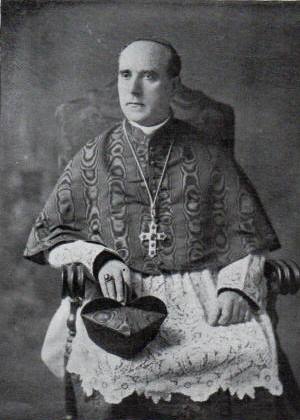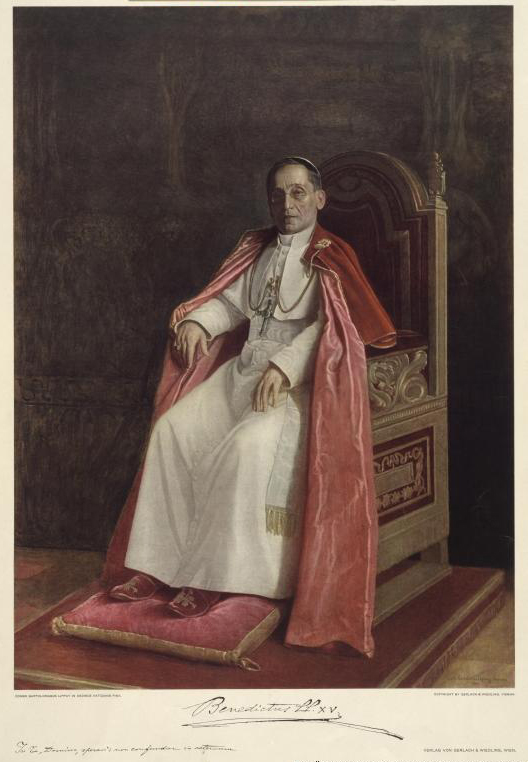|
Manuel Nin
Manuel Nin i Güell (born 20 August 1956) is a Spanish Catholic prelate who has served as Apostolic Exarch of Greece in the Greek Byzantine Catholic Church since 2016. He is a member of the Benedictines. Life Nin was born on August 20, 1956, in the town of El Vendrell in the Catalan province of Tarragona in Spain. He began his early studies in his hometown and completed them at the Colegio La Salle in Reus. After completing his studies, he entered the Abbey of Montserrat as a candidate on 20 September 1975, where he was received into the abbey's novitiate the following April. He professed temporary religious vows on 26 April 1977 and his solemn vows on 18 October 1980. He then began his studies toward his Baccalaureate in theology at the abbey's Theological School of Montserrat, during which time his concentration was on the classical languages of Latin, Greek and Syriac. After completing those studies, in 1984 Nin was sent to study in Rome, where he pursued a licentiate ... [...More Info...] [...Related Items...] OR: [Wikipedia] [Google] [Baidu] |
Catholic Particular Churches And Liturgical Rites
A particular church () is an ecclesiastical community of followers headed by a Bishop (Catholic Church), bishop (or Hierarchy of the Catholic Church#Equivalents of diocesan bishops in law, equivalent), as defined by Catholic canon law and Catholic ecclesiology, ecclesiology. A Ritual family, liturgical rite, a collection of liturgies descending from shared historic or regional context, depends on the particular church the bishop (or equivalent) belongs to. Thus the term "particular church" refers to an institution, and "liturgical rite" to its ritual practices. Particular churches exist in two kinds: # An autonomous particular church ''sui iuris'': an aggregation of particular churches with distinct Catholic liturgy, liturgical, Catholic spirituality, spiritual, Catholic theology, theological and Catholic canon law, canonical traditions. The largest such autonomous particular church is the Latin Church. The other 23 Eastern Catholic Churches are headed by bishops, some of which are ... [...More Info...] [...Related Items...] OR: [Wikipedia] [Google] [Baidu] |
Greek Byzantine Catholic Church
The Greek Byzantine Catholic Church (, ''Ellinórrythmi Katholikí Ekklisía'') or the Greek-Catholic Church of Greece is a '' sui iuris'' Eastern Catholic particular church of the Catholic Church that uses the Byzantine Rite in Koine Greek and Modern Greek. Its membership includes inhabitants of Greece and Turkey, with some links with Italy and Corsica. History There were several failed attempts to repair the East-West Schism between Greek and Latin Christians: the Council of Bari in 1098, the Council of Lyon in 1274, and the Council of Florence in 1439. Subsequently, many individual Greeks, then under Ottoman rule, embraced communion with the Catholic Church. They typically followed the Roman Rite of the Latin Church, maintaining their parishes through contact and support mostly from the Venetians. However, it was not until the 1880s that a particular church specifically for Greek Catholics who followed the Byzantine rite was built in the village of Malgara in Thrace. ... [...More Info...] [...Related Items...] OR: [Wikipedia] [Google] [Baidu] |
Syriac Language
The Syriac language ( ; ), also known natively in its spoken form in early Syriac literature as Edessan (), the Mesopotamian language () and Aramaic (), is an Aramaic#Eastern Middle Aramaic, Eastern Middle Aramaic dialect. Classical Syriac is the academic term used to refer to the dialect's literary usage and standardization, distinguishing it from other Aramaic dialects also known as 'Syriac' or 'Syrian'. In its West-Syriac Rite, West-Syriac tradition, Classical Syriac is often known as () or simply , or , while in its East-Syriac Rite, East-Syriac tradition, it is known as () or (). It emerged during the first century AD from a local Eastern Aramaic languages, Eastern Aramaic dialect that was spoken in the ancient region of Osroene, centered in the city of Edessa. During the Early Christian period, it became the main literary language of various Aramaic-speaking Christian communities in the historical region of Syria (region), Ancient Syria and throughout the Near East. As ... [...More Info...] [...Related Items...] OR: [Wikipedia] [Google] [Baidu] |
Brother (Catholic)
A religious brother (abbreviated Br. or Bro. as a title) is a lay male member of a religious institute or religious order who commits himself to following Christ in consecrated life, usually by the vows of poverty, chastity and obedience. Equivalent to a religious sister, a religious brother typically lives in a religious community and works in a ministry appropriate to his capabilities. A brother might practice any secular occupation. Some religious institutes are composed only of brothers; others are made up of brothers and clerics (priests or ministers, and seminarians). In some Christian groups, members refer to each other as "brother" or "sister". For example, Shakers use the title for all adult male members. History As monasticism developed in the early days of Christianity, most monks remained laymen, as ordination to ministry was seen as a hindrance to the monks' vocation to a contemplative life. Guided by the Rule of St. Benedict, the main lifestyle they followed ... [...More Info...] [...Related Items...] OR: [Wikipedia] [Google] [Baidu] |
Congregation For The Eastern Churches
The Dicastery for the Eastern Churches (also called the Dicastery for the Oriental Churches), previously named the Congregation for the Oriental Churches or Congregation for the Eastern Churches (), is a dicastery of the Roman Curia responsible for contact with the Eastern Catholic churches for the purpose of assisting their development and protecting their rights. It maintains whole and entire in the one Catholic Church the heritage and canon law of the various Eastern Catholic traditions. It has exclusive authority over Egypt and the Sinai Peninsula, Eritrea and northern Ethiopia, southern Albania and Bulgaria, Cyprus, Greece, Iran, Iraq, Lebanon, Israel (and Palestinian territories), Syria, Jordan and Turkey, and also oversees jurisdictions based in Romania, Southern Italy, Hungary, India and Ukraine. It was founded by the ''motu proprio'' ''Dei providentis'' of Pope Benedict XV as the "Sacred Congregation for the Oriental Church" on 1 May 1917. Structure Patriarchs and major ... [...More Info...] [...Related Items...] OR: [Wikipedia] [Google] [Baidu] |
Beatitudes
The Beatitudes () are blessings recounted by Jesus in Matthew 5:3–10 within the Sermon on the Mount in the Gospel of Matthew, and four in the Sermon on the Plain in the Gospel of Luke, followed by four woes which mirror the blessings. In the Latin Vulgate, each of these blessings begins with the word , which translates to (plural adjective). The corresponding word in the original Greek is (), with the same meaning. Thus "Blessed are the poor in spirit" appears in Latin as . The Latin noun was neologism, coined by Cicero to describe a state of blessedness and was later incorporated within the chapter headings written for Matthew 5 in various printed versions of the Vulgate. Subsequently, the word was anglicisation, anglicized to in the Great Bible, Great Bible of 1540, and has, over time, taken on a preferred spelling of ''beatitudes''. While some opinions can differ as to exactly how many distinct statements into which the Beatitudes should be divided (ranging from eig ... [...More Info...] [...Related Items...] OR: [Wikipedia] [Google] [Baidu] |
Doctoral Thesis
A thesis (: theses), or dissertation (abbreviated diss.), is a document submitted in support of candidature for an academic degree or professional qualification presenting the author's research and findings.International Standard ISO 7144: Documentation�Presentation of theses and similar documents International Organization for Standardization, Geneva, 1986. In some contexts, the word ''thesis'' or a cognate is used for part of a bachelor's or master's course, while ''dissertation'' is normally applied to a doctorate. This is the typical arrangement in American English. In other contexts, such as within most institutions of the United Kingdom, South Africa, the Commonwealth Countries, and Brazil, the reverse is true. The term graduate thesis is sometimes used to refer to both master's theses and doctoral dissertations. The required complexity or quality of research of a thesis or dissertation can vary by country, university, or program, and the required minimum study period ... [...More Info...] [...Related Items...] OR: [Wikipedia] [Google] [Baidu] |
Liturgy
Liturgy is the customary public ritual of worship performed by a religious group. As a religious phenomenon, liturgy represents a communal response to and participation in the sacred through activities reflecting praise, thanksgiving, remembrance, supplication, or repentance. It forms a basis for establishing a relationship with God. Technically speaking, liturgy forms a subset of ritual. The word ''liturgy'', sometimes equated in English as " service", refers to a formal ritual enacted by those who understand themselves to be participating in an action with the divine. Etymology The word ''liturgy'' (), derived from the technical term in ancient Greek (), ''leitourgia'', which means "work or service for the people" is a literal translation of the two affixes λήϊτος, "leitos", derived from the Attic form of λαός ("people, public"), and ἔργον, "ergon", meaning "work, service". In origin, it signified the often expensive offerings wealthy Greeks made in serv ... [...More Info...] [...Related Items...] OR: [Wikipedia] [Google] [Baidu] |
Eastern Christian
Eastern Christianity comprises Christianity, Christian traditions and Christian denomination, church families that originally developed during Classical antiquity, classical and late antiquity in the Eastern Mediterranean region or locations further east, south or north. The term does not describe a single Communion (Christian), communion or religious denomination. Eastern Christianity is a category distinguished from Western Christianity, which is composed of those Christian traditions and churches that originally developed further west. Major Eastern Christian bodies include the Eastern Orthodox Church and the Oriental Orthodox Churches, along with those groups descended from the historic Church of the East (also called the Assyrian Church (other), Assyrian Church), as well as the Eastern Catholic Churches (which are in communion with Holy See, Rome while maintaining Eastern Catholic liturgy, Eastern liturgies), and the Eastern Protestant Christianity, Eastern Protest ... [...More Info...] [...Related Items...] OR: [Wikipedia] [Google] [Baidu] |
Pontifical Atheneum Of St
A pontifical () is a Christian liturgical book containing the liturgies that only a bishop may perform. Among the liturgies are those of the ordinal for the ordination and consecration of deacons, priests, and bishops to Holy Orders. While the ''Roman Pontifical'' and closely related '' Ceremonial of Bishops'' of the Roman Rite are the most common, pontificals exist in other liturgical traditions. History Pontificals in Latin Christianity first developed from sacramentaries by the 8th century. Besides containing the texts of exclusively episcopal liturgies such as the Pontifical High Mass, liturgies that other clergymen could celebrate were also present. The contents varied throughout the Middle Ages, but eventually a pontifical only contained those liturgies a bishop could perform. The ''Pontificale Egberti'', a pontifical that once belonged to and was perhaps authored by Ecgbert of York, is regarded as one of the most notable early pontificals and may be the oldest to survi ... [...More Info...] [...Related Items...] OR: [Wikipedia] [Google] [Baidu] |
Pontifical Liturgical Institute
The Pontifical Liturgical Institute in Rome, located at Sant'Anselmo on the Aventine hill, promotes the study of the Sacred Liturgy. It is entrusted to the Benedictine Confederation, and has the role of training professors of liturgy and liturgical experts to advance the study and teaching of the Church's liturgy in the various parts of the world. Italian language programme Almost all of the courses are taught through the medium of the Italian language. Exceptionally, courses are offered in French, German, Spanish, Portuguese or English. English language programme Ever since the 1990s, successive presidi (deans) of the PIL have tried to establish English-language programmes of PIL courses in the US in order to provide access for English and Spanish-speaking students. First Prof. Cassian Folsom O.S.B approached the University of Chicago, and later Prof Juan Javier Flores Arcas O.S.B. approached the St Thomas University, Miami, but these have not yet borne fruit. Similarly, furthe ... [...More Info...] [...Related Items...] OR: [Wikipedia] [Google] [Baidu] |
Pontifical Oriental Institute
The Pontifical Oriental Institute, also known as the Orientale, is a Catholic institution of higher education located in Rome and focusing on Eastern Christianity. The plan of creating a school of higher learning for Eastern Christianity had been on the agenda of the Catholic Church since at least Pope Leo XIII, but it was only realized in 1917 by Pope Benedict XV. The Orientale forms part of the consortium of the Pontifical Gregorian University (founded in 1551) and the Pontifical Biblical Institute (founded in 1909), both in Rome. All three institutions are run by the Society of Jesus (Jesuits). While the Orientale depends on the Holy See, its management is entrusted to the Society of Jesus. Its chancellor is the Prefect of the Congregation for the Eastern Churches and its vice-chancellor is the superior general of the Society of Jesus, while the Congregation for Catholic Education is the dicastery competent for approving the academic programmes of the Orientale. Each year, ... [...More Info...] [...Related Items...] OR: [Wikipedia] [Google] [Baidu] |






